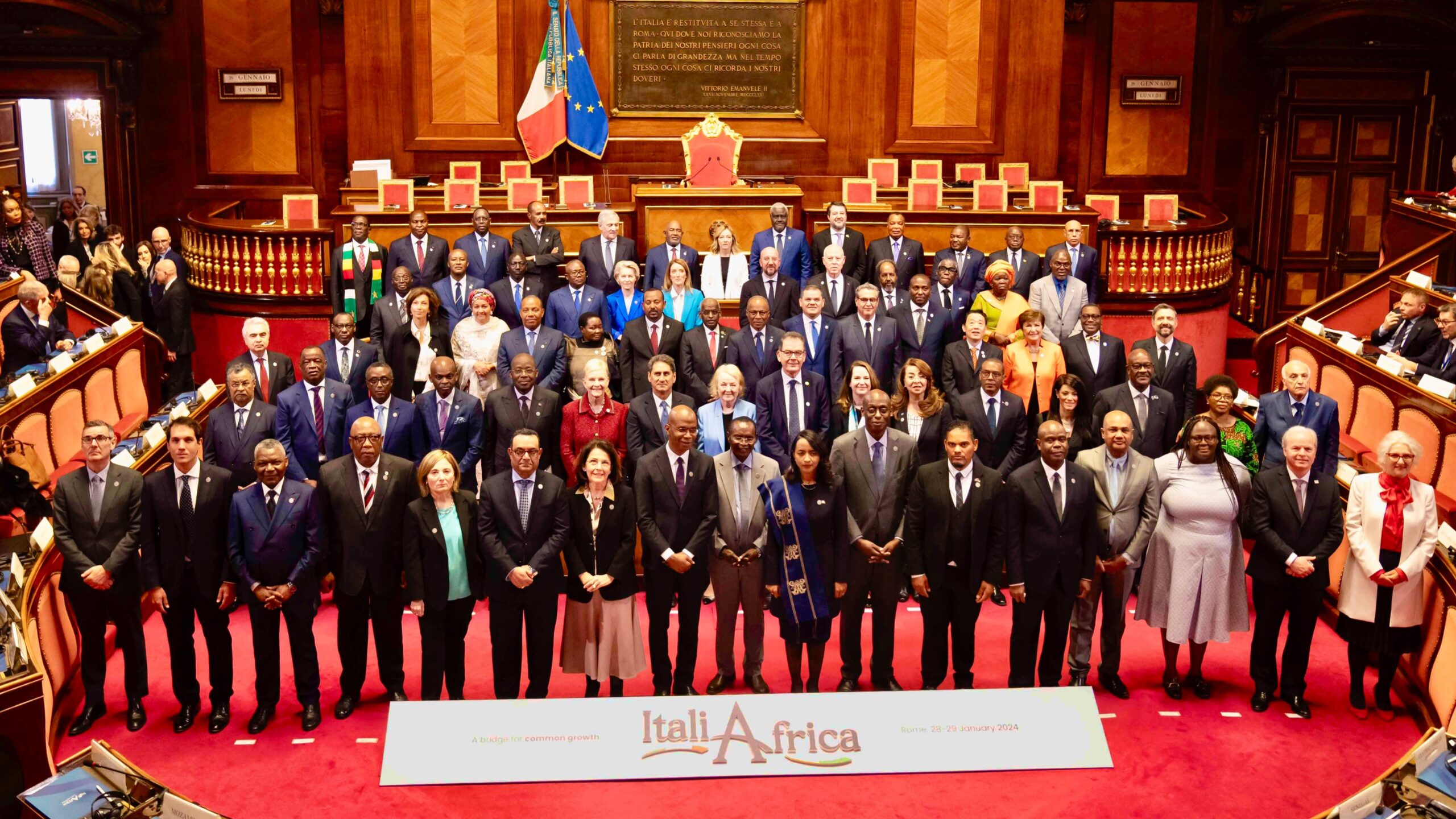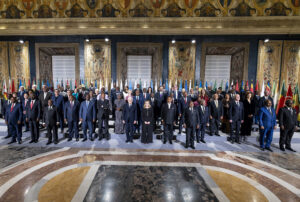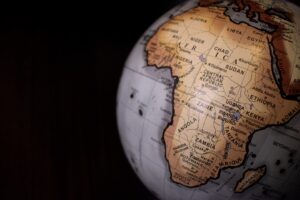The Italy-Africa Summit “A bridge for common growth”, held in Rome on 29 January, was awaited by many as the occasion for Italy’s Prime Minister Giorgia Meloni to announce the guidelines of the Mattei Plan for the development of the African continent.
Africa as a priority of the Italian government
From an institutional standpoint, the participation to the Summit of 46 African states, major international organisations, international financial institutions and multilateral development banks, as well as the leaders of the European Union, bodes well for the convening power of the Italian government and its international positioning. In particular, given the need to frame the Mattei Plan within the multilateral and European dimension, the presence of top European officials – the President of the European Commission Ursula von der Leyen, the President of the European Parliament Roberta Metsola, and the President of the Council President Charles Michel – is certainly a positive signal.
As a demonstration of Italy’s strong political mandate towards the African continent, which also represents a top priority of its 2024 G7 Presidency mandate, Italy turned the Italy-Africa Ministerial Conferences into a Summit at the highest institutional levels.
The ambiguities of the Mattei Plan
Going beyond the more institutional and politically symbolic character of the Summit, it is difficult to give an overall judgment of the Mattei Plan. Indeed, the Summit did not reveal radically new elements with respect to what we already knew: the Plan will represent an open and shared platform for cooperation with African countries, intentionally based on an equal, non-predatory and non-charitable approach, with the goal of contributing to Africa’s growth by enabling the continent to prosper through its own resources thanks to innovative projects and strategies.
No development without climate
The new page of relations with Africa that the Italian government is committed to write paradoxically seems to lack in innovation. A strategy for Africa that can truly promote development and kick-start an evolution of relations with the continent cannot exclude climate, a dimension that was only marginally addressed in the Summit. Indeed, today, it is not feasible for any Development Plan to exclude the climate issue. This is even more true for a region like Africa, which is characterized by a high climate risk that is often at the roots of instability fuelling migration flows towards Europe – those same flows that Italy wants to contain. Neglecting climate also means failing to seize the great opportunities offered by investments in energy and industrial transition technologies, in Africa as elsewhere.
The elephant in the room: the exploitation of fossil fuels
While climate was almost absent in the Summit, on the other hand the dimension of fossil fuels (Oil&Gas) emerged quite clearly – though no explicit mention was made, at least in the public segment of the conference. As a matter of fact, the Plan is likely to generate new energy partnerships based precisely on fossil fuels. Oil&gas was not directly discussed during the public segments of the Summit – although the presence among the delegates of Eni’s CEO and other representatives for the energy industry suggests the central role that the fossil industry will continue to play in the Plan. Eni’s interests are also involved in the biofuels supply chain, where Kenya – mentioned by Meloni – represents a big recipient of investments.
Looking for climate?
At COP28, Meloni raised Italy’s ambitions on climate, announcing a 100 million euros allocation for the newly created Loss and Damage fund, and a new 300 million euros contribution for the Green Climate Fund, while committing to targets on renewable energy, energy efficiency, and transitioning away from fossil fuels.
Nevertheless, the ambition on climate and energy displayed by Giorgia Meloni at COP28 was not replicated at the Italy-Africa Summit, where neither clear energy priorities related to decarbonisation targets nor a defined strategy on how to support the continent in transitioning away from fossil fuels emerged. More generally, there seems to be a lack of awareness of the centrality of the climate dimension as an integral, non-negotiable part of Italy’s broader policies – starting with foreign policy.
Climate and migration
The Summit also did not delve into the effects that climate change has on migration – this was only mentioned with reference to the issue of water scarcity and its related risk of generating conflicts and increasing migration flows. Climate is increasingly recognised as a driver of migration, as also underlined by the Secretary General of the International Organization for Migration, who recently stated that “climate change is now forcing more people to move than conflicts do.”
The climate-migration and the climate-development nexus, which were also emphasized at the International Conference on Migration and Development organised by Meloni herself last July 2023, represent key dimensions for a realistic and integrated approach towards the African continent – all the more so for a strategy such as the Mattei Plan, which aims at promoting prosperity and development with the long-term goal of decreasing migration flows to Europe.
An essential ambiguity on energy
Energy is confirmed as a central pillar of the Mattei Plan. To date, more than 71% of Italian imports from the African continent are energy products, and in 2023 Africa was Italy’s first energy partner. During the Summit, the PM once again insisted on the ambition to make Italy an “energy hub” between Europe and Africa, by supporting projects aimed at both domestic use and export, in order to secure new energy supplies for Europe while supporting development in Africa. Statements by Eni CEO Claudio Descalzi, who attended the Summit, also suggest that the continent’s abundance of energy resources will be central to guarantee energy security in Italy and Europe while ensuring local development. This narrative, however, is not based on reality: while energy security in Italy and Europe is no longer at risk, the rhetoric of gas for development is at odds with the evidence that the sustainable, long-term growth Africa needs cannot be based on fossil fuels. The cases of both Mozambique and the Republic of Congo well demonstrate this point.
What about renewables?
Regarding renewable energies, the Italian Minister of Foreign Affairs and International Cooperation Antonio Tajani reiterated in his speech the possibilities of cooperation between Italian and African companies also in the field of renewable energies. In doing so, he referred to the law on governance of the Mattei Plan recently adopted by the Italian Parliament, which mentions the “development of energy partnership also in the field of renewable sources.”
Renewables energies are more overtly mentioned in the document entitled “The Five Pillars of the Mattei Plan,” published on the Italian government’s website. For what concerns the energy pillar, the document states that “interventions will be centred on the climate-energy nexus, strengthening energy efficiency and the use of renewable energies through actions aimed at accelerating the transition of electricity systems, in particular for electricity generation from renewable sources(…).” In this framework, the role of the private sector, which was also stressed in Minister Tajani’s speech, emerges quite starkly, with reference in particular to the creation of innovation centres “where Italian companies will be able to select local start-ups.” This aspect will need to be further explored in order to understand how it can concretely develop in the framework of a process of cooperation among equals.
Renewable energies were also one of the focal points of the speech by the President of the European Commission Ursula von der Leyen. Here, three areas where Europe and Africa are working together, and where Italy’s engagement can really make a difference, were identified: energy and climate, education, and migration. Within this framework, von der Leyen focused on the one hand on Africa’s immense potential for renewable energies, and on the other on the need to invest more in infrastructures, also thanks to the resources allocated by the EU Global Gateway Initiative.
The need to frame the Mattei Plan within a broader European framework of strengthened relations and cooperation between Africa and Europe also emerged in the words of the President of the European Parliament Roberta Metsola. In this process, renewable energy should be at the centre, as called for by African leaders in the Nairobi Declaration at the African Climate Summit in September 2023, and as also reiterated by the President of Kenya, William Ruto. During the Italy-Africa Summit, Ruto emphasised that renewable energies are the rational choice from an economic point of view and should thus represent a priority.
How to concretely write a new page in Italy-Africa relations?
According to what emerged from the Summit, writing a new page in Italy-Africa relations means investing in the medium to long term in key areas that represent shared priorities: education and training, health, agriculture (including food security and food safety), water, and energy.
Meloni listed several pilot projects under each of these pillars, targeting several African countries – with the final goal of replicating them in the whole continent.
The specific reference to concrete initiatives during both her opening and closing remarks seemed to respond to the need to dispel doubts about the Plan’s lack of concreteness and effective planning, which had represented a source of concern in the weeks leading up to the Summit. On this line, both in her opening and closing remarks, the PM insisted on the pragmatic nature of the Plan, on the need to closely monitor its activities and objectives and to outline a timetable. This should be conducive to a new method of work to be extended to all other countries wishing to get on board. On the other hand, there remains the risk for the Plan to represent a sort of patchwork of initiatives disconnected from one another, without a real strategic framework that can really guide a new partnership between African countries, Italy and Europe.
How will the Mattei Plan be financed?
Substantial financial resources are necessary to do all of this. According to what has emerged, 5.5 billion euros have been allocated to the Plan so far: 3 billion from the Italian Climate Fund (FIC), and 2.5 billion from resources dedicated to Development Cooperation. The FIC, managed by Cassa Depositi e Prestiti (CDP), was established in 2022 as the main national public instrument for pursuing Italy’s objectives under international climate and environment agreements, with an allocation of 4.2 billion in the period between 2022 and 2026. As confirmed by Meloni during COP28, 70% of the FIC is expected to be dedicated to Africa – such 70% corresponds to the 3 billion mentioned during the Summit. The FIC’s focus on climate will be equally divided between mitigation and adaptation. From an operational point of view, this is an instrument designed for Italian companies wishing to invest in Africa, and as such it provides risk capital operations, financing and guarantees.
A third financial instrument will be added to these two baskets by the end of the current year; from what we know so far, it will also involve CDP and aim at facilitating the contribution of the private sector in the projects involved in the Mattei Plan.
Meloni herself explained that the resources allocated so far are – obviously – not enough, and she called for international financial institutions, Multilateral Development Banks, the European Union and other donor states to contribute. In addition to the scarce amount so far allocated to the Plan (to draw a parallel, the African strand of the EU Global Gateway Initiative can count on 150 billion), another issue concerns the fact that these are not new financial resources, but rather funds already available and reallocated to the Mattei Plan. Not enough, then, and nothing new to support a Plan that aims at kick-starting a new phase in the relations with Africa.
Participation and co-participation: an open dossier
While the participation of African leaders to the Summit (also encouraged by Italy’s role as President of the G7) exceeded expectations, the issue of the co-definition of the Plan with African partners has emerged as a critical point of the Summit (and of the broader process related to the Mattei Plan).
On the one hand, Moussa Faki, President of the African Union (AU) Commission, pointed out in his speech that greater involvement of the AU in the Mattei Plan would have been necessary. To understand the relevance of this comment, it is necessary to contextualise it within the Italian government’s intention to write the Plan together with African countries, made explicit by Meloni on the occasion of her visit to Mozambique and the Republic of Congo last October. Meloni also insisted on this point several times during the Summit, ruling out that the Mattei Plan could be a “closed box” to be imposed top-down on African countries.
On the other hand, the total absence of Italian and African civil society at the Summit was highly remarked. Such an absence felt even more relevant considering that many representatives of the Italian companies that will be most involved in the Plan attended the Summit; as such, participation was not limited to institutions. In this regard, last week 79 African Civil Society Organizations (CSOs) sent a letter to President of the Italian Republic Sergio Mattarella and to the Italian government, bringing to their attention a series of requests for the Italian Plan on Africa.
All in all, it remains to understand how an effective cooperation with African partners will develop on multiple levels – involving both leaders and civil society, which is indeed mentioned in the law that established the Plan’s Steering Committee – and at different stages – from project definition to implementation, without forgetting the key dimension of impact assessment. Another constituency that needs to be involved is the African diaspora in Italy, which, as also mentioned by Mattarella at the dinner that opened the Summit, has strongly contributed to tighten the bond which unites Italy with African countries.
What steps after the Summit?
The Summit and the related announcements on the Mattei Plan clearly represent only a first step in a process that will necessarily be long and complex, and that should involve coordination among several heterogeneous realities, at the Italian and African levels.
In order to follow up on what was promised during the Summit and give life to a Plan “for and with Africa” that is truly innovative and strategic, we expect climate to be at the forefront, in terms of investment for adaptation to climate change, as well as through initiatives that favour the energy and industrial transition of African countries. In this context, the results of the first meetings of the Plan’s Steering Committee, which is expected to meet soon, will be essential to understand the pace and direction of this macro-initiative.
During the year of its G7 presidency, Italy has the opportunity to put into practice its good intentions and promote ambitious international commitments, starting with collecting and championing African countries’ call for reform of the international financial system. This is the way for Italy to remain truly open to African voices and their demands and priorities – as befits a non-predatory Plan.
Without accountability, openness, boldness and innovation, Meloni’s intention to build a new and fairer relationship with and between nations will fail. There is still time to catch up. The Italian G7 summit in June is the next stage that will tell us whether we are witnessing a real “paradigm shift,” as Meloni advocates and hopes, or another empty promise.
Photo from Giorgia Meloni’s Twitter account







